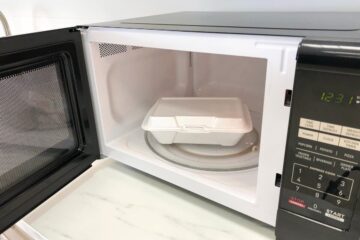Microwaves are a staple appliance in many households, providing a quick and convenient way to heat up food. However, if you find that your microwave keeps blowing fuses, it can be frustrating and inconvenient. In this article, we will explore the causes of microwave fuse blowing, warning signs to look out for, and common fixes. We will also provide tips on how to prevent fuse blowing and extend the lifespan of your microwave.
The Basics Of Microwave
How Microwaves Work:
To understand why microwaves blow fuses, it is essential to know how they work. Microwaves use electromagnetic waves to heat up food. The waves cause the water molecules in the food to vibrate, producing heat. The components of a microwave include a high-voltage transformer, a magnetron, and a capacitor. These components work together to produce and distribute the electromagnetic waves.
What Causes Fuses to Blow?
Fuses play an important role in preventing electrical fires by breaking the circuit when there is an electrical overload. There are several causes of microwave fuse blowing, including overheating, power surges, faulty components, and defective wiring. Overheating can occur when the microwave is overused or when it is not adequately ventilated.
Power surges can happen when there are fluctuations in the electrical supply. Faulty components, such as the magnetron or capacitor, can also cause the fuse to blow. Defective wiring can lead to a short circuit, causing the fuse to blow.
Warning Signs of a Blown Fuse
There are several warning signs that your microwave fuse has blown. These include no power, sparks and smoke, strange sounds, a tripped circuit breaker, and a burning odor. If you notice any of these signs, it is essential to stop using the microwave immediately and investigate the issue.
Common Fixes for a Blown Fuse
If your microwave fuse has blown, there are several steps you can take to fix the issue. These include troubleshooting the microwave, replacing the fuse, checking and repairing faulty components, and ensuring proper ventilation. Troubleshooting involves identifying the cause of the issue and resolving it.
Replacing the fuse is a simple fix that can be done at home. Checking and repairing faulty components may require the help of a professional. Ensuring proper ventilation can help prevent future fuse blowing.
Preventing Fuse Blowing
There are several precautions you can take to avoid blown fuses in your microwave. These include using the microwave properly, performing regular maintenance, and following electrical safety tips. Proper usage involves not overusing the microwave and not using it for purposes it was not intended for.
Regular maintenance includes cleaning the microwave and doing routine checks. Electrical safety tips include not plugging too many appliances into a single outlet and using surge protectors.
Microwave Brands Prone to Fuse Blowing
Some microwave brands are more prone to fuse blowing than others. These include brands such as LG, Samsung, and Whirlpool. Potential reasons for the trend include poor ventilation and faulty components.
Repairing vs. Replacing a Microwave
When faced with a blown fuse issue, you may need to decide whether to repair or replace the microwave. Considerations for repairing or replacing a microwave include the cost, age of the microwave, and the severity of the issue. Pros and cons of each option should be considered before making a decision.
The Cost of Fixing a Blown Fuse
The cost of fixing a blown fuse depends on several factors, such as the severity of the issue and the cost of replacement parts. Estimates of potential costs can help you decide whether to repair or replace the microwave.
Common Mistakes to Avoid When Fixing a Blown Fuse
Common errors made when fixing a blown fuse include not properly troubleshooting the issue and not following safety precautions. Tips to avoid making these mistakes include seeking professional help when necessary and following safety guidelines.
How to Choose the Right Microwave?
Factors to consider when choosing a microwave include size, features, and brand reputation. It is also important to consider which brands are known for fuse blowing.
Microwave Maintenance Tips
Maintenance tips to extend the lifespan of your microwave include cleaning methods and safety precautions. Cleaning the microwave involves regularly wiping it down and performing deep cleans. Safety precautions include avoiding overuse and monitoring the appliance during use.
How to Test a Microwave Fuse?
Testing a microwave fuse involves using a multimeter to check the continuity of the fuse. The necessary tools required are a multimeter and a screwdriver.
Professional Microwave Repair
When to seek professional repair for a microwave includes when the issue is severe or when you are not comfortable fixing the issue yourself. Finding a reliable repair service involves researching local providers and checking reviews.
Microwave Safety Tips
Important safety tips when using a microwave include not putting metal in the microwave, not leaving the microwave unattended during use, and monitoring the appliance during use
Conclusion
Microwave fuse blowing is a common issue that can be frustrating and inconvenient. However, by understanding the causes, warning signs, and common fixes, you can resolve the issue and prevent it from happening in the future. Following proper usage, maintenance, and electrical safety tips can also help extend the lifespan of your microwave. If you are unsure about fixing the issue yourself, seek professional help.
By taking the necessary precautions and following the tips outlined in this article, you can enjoy the convenience of your microwave without the worry of blown fuses.
Related Queries
Q: Can a blown fuse be fixed at home?
A: Yes, a blown fuse can be fixed at home by replacing the fuse. However, if the issue is severe, it is recommended to seek professional help.
Q: How often should I perform maintenance on my microwave?
A: It is recommended to perform routine checks and cleanings on your microwave every 3-6 months.
Q: Can faulty components be repaired or do they need to be replaced?
A: Depending on the severity of the issue, faulty components can sometimes be repaired. However, in some cases, replacement may be necessary.
Q: Can using the wrong type of fuse cause issues?
A: Yes, using the wrong type of fuse can cause issues such as electrical overload and blown fuses.
Q: Can fuse blowing be prevented?
A: Fuse blowing can be prevented by following proper usage and maintenance guidelines, as well as electrical safety tips.



![Samsung Microwave Oven Errors/Faults | C-Codes [Solved] samsung microwave oven errorsfaults c-codes](https://thekitcheneye.com/wp-content/uploads/2023/04/samsung-microwave-oven-errorsfaults-c-codes-360x240.jpg)